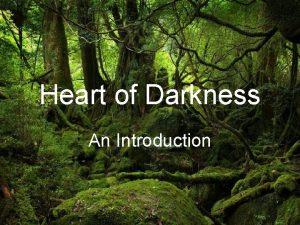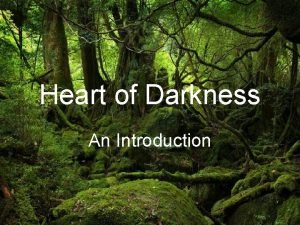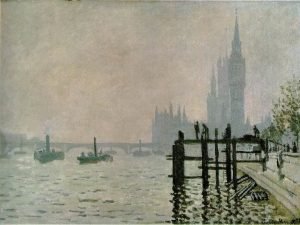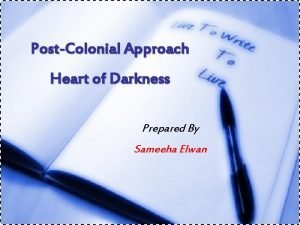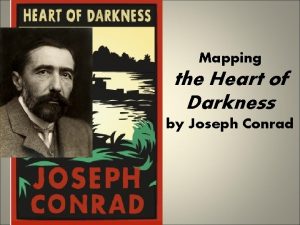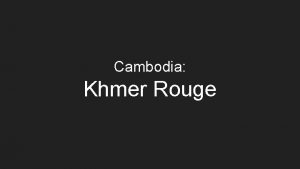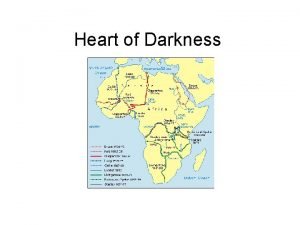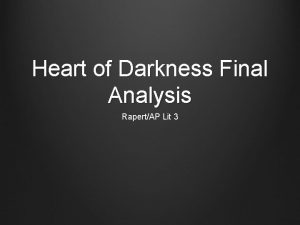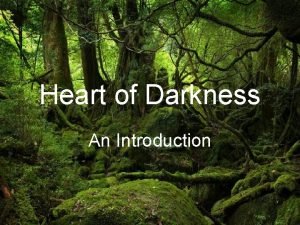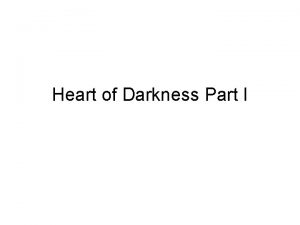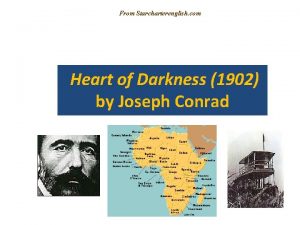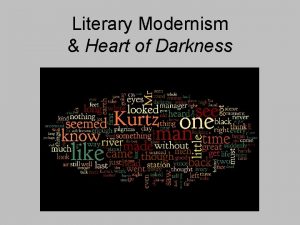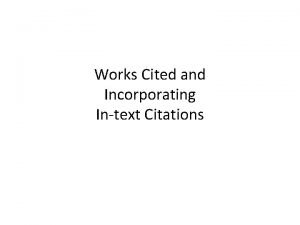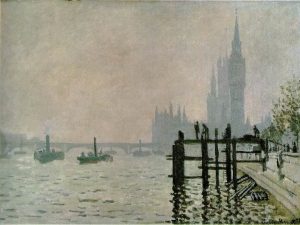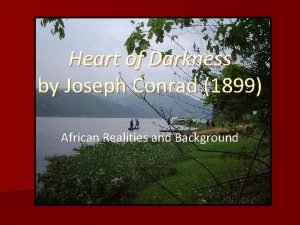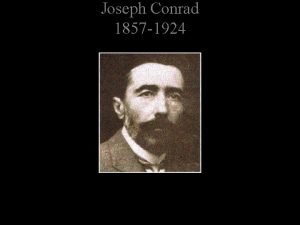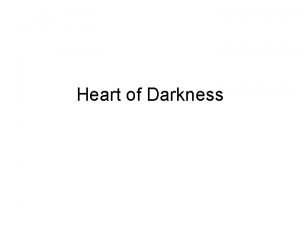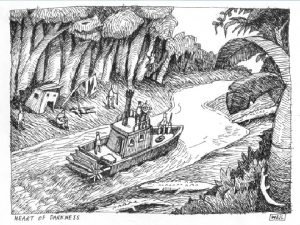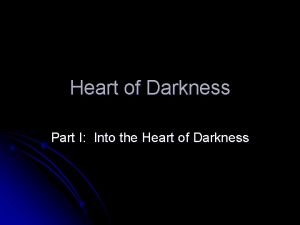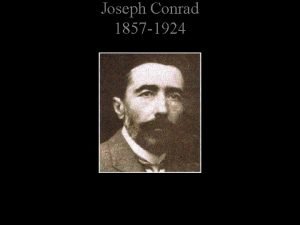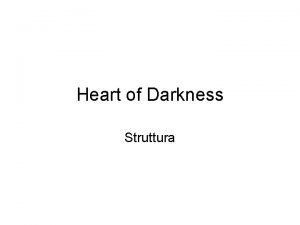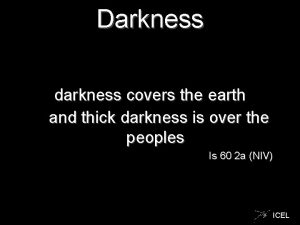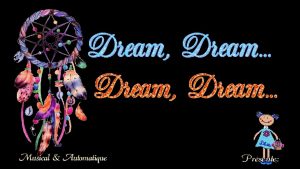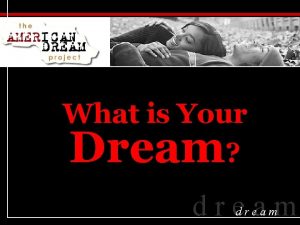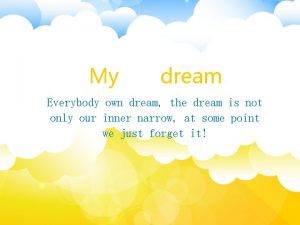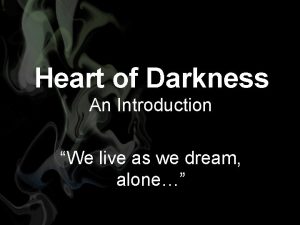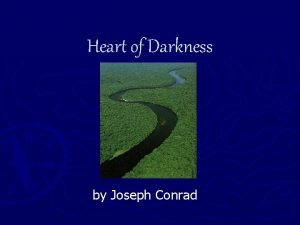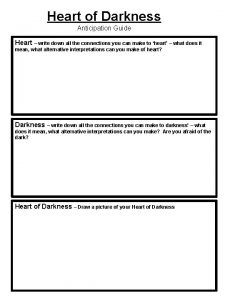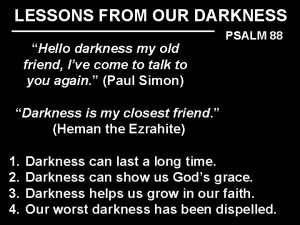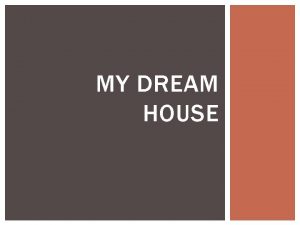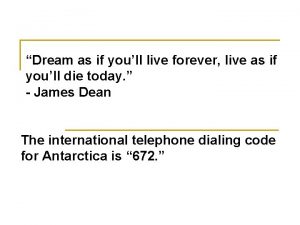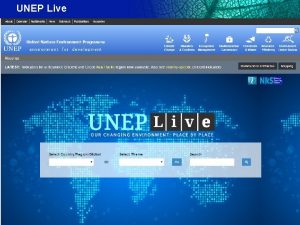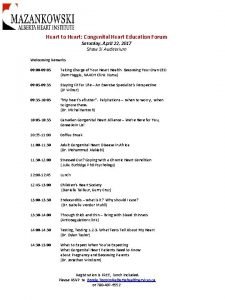Heart of Darkness We live as we dream





















- Slides: 21

Heart of Darkness “We live, as we dream, alone…”

Joseph Conrad’s Life • Born 1857 in Russian-occupied Poland • Patriot father & family exiled in Russia 1862 • Both parents dead of illness by 1869 • • Conservative uncle took him in Joined British Merchant Marine 1878

Joseph Conrad’s Life • With the help of a relative in Brussels, took position as captain of a steamer for a Belgian trading company. • Conrad had dreamed of sailing the Congo • He had to leave early for the job, as the previous captain was killed in a trivial quarrel – mentally and physically unprepared for journey

Historical Context • In 1890, Joseph Conrad secured employment in the Congo as the captain of a river steamboat, the approximate year in which the main action of Heart of Darkness takes place. • Illness forced Conrad's return home after only three months in Africa • Today, the country at the center of Heart of Darkness is called the Democratic Republic of the Congo, Congo , but in Conrad’s time it was the Congo Free State, or Belgian Congo.

Heart of Darkness • First published as a serial in London’s Blackwood Magazine in 1899 • Considered by many to be the finest short novel ever written in English • Bridges the Victorian and Modern literary periods • Modern criticism sharply divided over merit due to racist/imperialist themes

Key Facts • Full Title: Heart of Darkness • Author: Joseph Conrad • Type of Work: Novella (between a novel and a short story in length and scope) • Genre: Symbolist, colonial literature, adventure tale, frame story

Key Facts • Time and Place Written: England, 1898– 1899; inspired by Conrad’s journey to the Congo in 1890 • Date of First Publication: Published in 1902 in the volume Youth: A Narrative; and Two Other Stories • Narrator: There are two narrators: an anonymous passenger on a pleasure ship, who listens to Marlow’s story, and Marlow himself, a middle-aged ship’s captain. • Point of View: The first narrator speaks in the first-person plural, on behalf of four other passengers who listen to Marlow’s tale. Marlow narrates his story in the first person, describing only what he witnesses and experiences, and provides his own commentary on the story.

Key Facts • Setting (time): Latter part of the nineteenth century, probably sometime between 1876 and 1892 • Setting (place): Opens on the Thames River outside London, where Marlow is telling the story that makes up Heart of Darkness. Events of the story take place in Brussels, at the Company’s offices, and in the Congo, then a Belgian territory. • Protagonist: Charlie Marlow

Historical Context

Historical Context The Congo River was discovered by Europeans in 1482 No one traveled more than 200 miles upstream until 1877 Is 1, 600 miles long and only impassable to water traffic between two places, creating a two-hundred mile overland trip s Matadi (the Company Station) s Kinshasa (the Central Station)

King Leopold and the Congo • Belgium, as a small country, did not possess numerous overseas colonies, unlike its neighbours but shared their imperial ambitions. Leopold persuaded other European powers at the Berlin Conference of 1884 -85 to give him personal possession of the Congo. • In 1886 he organized an international association as a front for his private plan to “develop” central Africa. • Leopold used the Congo as a huge moneymaking resource, committing human rights violations in the process, as he built public works projects in Belgium with the money he accrued. 11

5 -8 Million Victims (50% of Population) “It is blood-curdling to see them (the soldiers) returning with the hands of the slain, and to find the hands of young children amongst the bigger ones evidencing their bravery. . . The rubber from this district has cost hundreds of lives, and the scenes I have witnessed, while unable to help the oppressed, have been almost enough to make me wish I were dead. . . This rubber traffic is steeped in blood, and if the natives were to rise and sweep every white person on the Upper Congo into eternity, there would still be left a fearful balance to their credit. ” -- Belgian Official

The Ivory Trade • Most Europeans in the 1890 s felt that the African peoples needed exposure to European culture and technology to become more evolved. • This responsibility was known as “the white man’s burden” and the fervor to bring Christianity and commerce to Africa grew. • In return for these “benefits, ” the Europeans extracted HUGE amounts of ivory.

Narrative Style in HOD • Frame Narrative – (story within story) with narrator, Marlow • Circular Structure – mimics oral storytelling, readers sits down with sailors, ready to hear myth or quest • Light and Dark – motifs, symbols • Transformation –physical, psychological


Heart of Darkness Motifs • Darkness • • • Primitive Impulses (Kurtz, previous captain, etc. ) Cruelty of Man (Kurtz and Company) Immorality/Amorality (Kurtz) Lies/Hypocrisy Imperialization/Colonization Power Corrupts Savage vs. Civil Role of Women • Civilization exploitive of women • Civilization as a binding and self-perpetuating force Physical connected to Psychological Barriers (fog, thick forest) Rivers (connection to past, parallels time and journey)


What is Modernism? • Modernism claims to show: – a more accurate representation of reality – a better understanding of human consciousness • The 20 th century “vision” places its emphasis on how we know – on the structures of perception themselves – rather than on traditional elements such as plot and character development.

The Archetypal Quest • HOD is a modern myth (= tradition of quest narrative) – In a quest, the story develops as a central character, the hero, meets and overcomes a series of obstacles on the way to accomplishing a task. – archetypal quest stories – Virgil’s Aeneid & Dante's Inferno • HOD contains mythological “quest” elements: -- fellow journeymen (the Pilgrims) -- a fool (the Harlequin = the Russian) -- a set of obstacles as they travel down river (“descent to the underworld”)

Psychological Interpretation • Conrad goes out of his way to suggest that in some sense Marlow's journey is like a dream or a return to our primitive past -- an exploration of the dark recesses of the human mind. – Apparent similarities to the psychological theories of Sigmund Freud in its suggestion that dreams are a clue to hidden areas of the mind – we are all primitive brutes and savages, capable of the most appalling wishes and the most horrifying impulses (the Id) – we can make sense of the urge Marlow feels to leave his boat and join the natives for a savage whoop and holler – notice that Marlow keeps insisting that Kurtz is a voice -- a voice who seems to speak to him out of the heart of the immense darkness

Questions to Consider as you Read: Read • What does it mean to be “savage” or “civilized? ” • What are the different meanings of the words “dark” and “light”? Notice how many times Conrad uses this description in different ways. • Why do people choose to do good? or evil?
 Impressionism in heart of darkness
Impressionism in heart of darkness Heart of darkness introduction
Heart of darkness introduction Heart of darkness
Heart of darkness Edward said two visions in heart of darkness
Edward said two visions in heart of darkness Marlow's journey in heart of darkness map
Marlow's journey in heart of darkness map Heart of darkness cambodia
Heart of darkness cambodia Heart of darkness map
Heart of darkness map Heart of darkness part 3 quotes
Heart of darkness part 3 quotes Modernism in heart of darkness
Modernism in heart of darkness Heart of darkness part one
Heart of darkness part one Heart of darkness theme
Heart of darkness theme Heart of darkness modernism
Heart of darkness modernism Symbols heart of darkness
Symbols heart of darkness Heart of darkness mla citation
Heart of darkness mla citation Heart of darkness map
Heart of darkness map Themes heart of darkness
Themes heart of darkness Heart of darkness slavery quotes
Heart of darkness slavery quotes Setting in heart of darkness
Setting in heart of darkness Heart of darkness lesson plans
Heart of darkness lesson plans Heart of darkness part 1 analysis
Heart of darkness part 1 analysis Rivets heart of darkness
Rivets heart of darkness Tim roth heart of darkness
Tim roth heart of darkness
